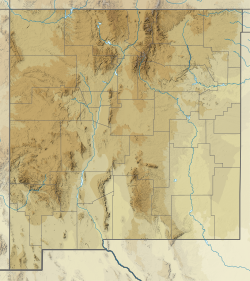The Grayburg Formation is a geologic formation in west Texas and southern New Mexico.[1] It preserves fossils dating back to the Guadalupian Epoch of the Permian Period.[2]
| Grayburg Formation | |
|---|---|
| Stratigraphic range: | |
| Type | Formation |
| Unit of | Artesia Group |
| Underlies | Queen Formation |
| Overlies | San Andres Formation |
| Thickness | 294 feet (90 m) |
| Lithology | |
| Primary | Dolomite |
| Other | Sandstone, anhydrite |
| Location | |
| Coordinates | 32°50′38″N 104°01′01″W / 32.844°N 104.017°W |
| Region | New Mexico Texas |
| Country | United States |
| Type section | |
| Named for | Grayburg pool |
| Named by | R.I. Dickey |
| Year defined | 1940 |
Description
editThe formation is found mostly in the subsurface and consists mostly of dolomite with some sandstone and anhydrite.[1] The formation becomes more dominantly carbonate rock near the Guadalupe Reef and the beds become thicker. Away from the reef, the formation becomes increasingly dominated by sandstone.[2]
The formation is interpreted as shallow marine sediments deposited on the San Andres platform, which flanked the Delaware and Midland Basins. The interbedded carbonate rocks and sandstone reflect fluctuations in sea level.[3]
History of investigation
editThe formation was first defined by Robert I. Dickey in 1940 based on well logs. Dickey assigned the formation to the now-defunct Whitehorse Group.[1] D.B. Tait, W.S. Motts, and M.E. Spitler reassigned the formation to the Artesia Group in 1962.[4] V.C. Kelley subsequently adjusted the definition of the lower contact of the formation, in 1971.[2]
Footnotes
edit- ^ a b c Dickey 1940.
- ^ a b c Kelley 1971.
- ^ Barnaby, R.J.; Ward, W.B. (1 January 2007). "Outcrop Analog for Mixed Siliciclastic-Carbonate Ramp Reservoirs--Stratigraphic Hierarchy, Facies Architecture, and Geologic Heterogeneity: Grayburg Formation, Permian Basin, U.S.A.". Journal of Sedimentary Research. 77 (1): 34–58. doi:10.2110/jsr.2007.007.
- ^ Tait, Motts & Spitler 1962.
References
edit- Dickey, Robert I. (1940). "Geologic Section from Fisher County Through Andrews County, Texas, to Eddy County, New Mexico". AAPG Bulletin. 24 (1): 37–51. doi:10.1306/3D93318E-16B1-11D7-8645000102C1865D.
- Kelley, V.C. (1971). "Geology of the Pecos country, southeastern New Mexico". New Mexico Bureau of Mines and Mineral Resources Memoir. 24. Retrieved 17 June 2021.
- Tait, D.B.; Motts, W.S.; Spitler, M.E. (1962). "Artesia Group of New Mexico and West Texas". American Association of Petroleum Geologists Bulletin. 46 (4): 504–517. doi:10.1306/BC74383B-16BE-11D7-8645000102C1865D.

